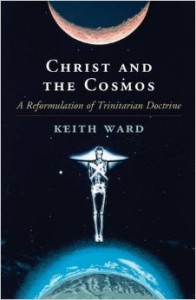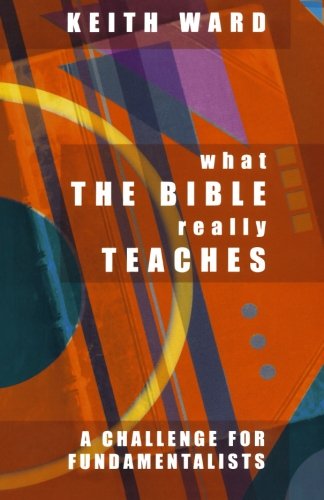Podcast: Play in new window | Download
Subscribe: Spotify | Email | RSS
Dr. Keith Ward is a prolific and influential theologian, philosopher, and scholar of religions. He’s also an Anglican priest. In this first of two interviews on his 2015 book Christ and the Cosmos: A Reformulation of Trinitarian Doctrine (kindle), we discuss his christology, how to understand what is unique about the man Jesus.
Among other topics, we discuss
- the Logos (Word) of John 1, and how this relates to the man Jesus
- his reply to an objection that his christology makes Jesus to be “a mere man”
- his agreements and disagreements with the mainstream catholic tradition in christology stemming from the council at Chalcedon in 451
- the idea of “spirit christology”
- his view that eschatology must be reconceived in light of recent cosmology
Next week, in our second interview, we’ll focus on what he says specifically about the Trinity.
You can also listen to this episode on Stitcher or iTunes (please subscribe, rate, and review us in either or both – directions here). It is also available on YouTube (you can subscribe here). If you would like to upload audio feedback for possible inclusion in a future episode of this podcast, put the audio file here.
You can support the trinities podcast by ordering anything through Amazon.com after clicking through one of our links. We get a small % of your purchase, even though your price is not increased. (If you see “trinities” in you url while at Amazon, then we’ll get it.)
- Dr. Ward’s website
- interviews of Dr. Ward by Robert Lawrence Kuhn
- some of Dr. Ward’s books
- Donald Baillie and John Baillie
- Roger Haight, “The Case for Spirit Christology“
- the christological “definition” from the council of Chalcedon
- 2nd-3rd century catholic “monarchians“
- Universals
- biblical cosmology
- This week’s thinking music is “Behind Your Window” by Kai Engel.




Interesting podcast, I do like how he reminds us that the redemtption work of christ is not merely of the Human race, but the entirety of the Universe. However, one thing particularly caught my attention:
Dr. Wards emphasis that the end of the universe would not be for millions of years.The laws of thermodynamics and the laws of physics in general, assume our universe is a closed system. This question is a metaphysical question, and not one in the realm of the physical sciences.
Its seems strange to me that one who advocates Gods intervention into our world, with acts such as an incarnation and resurrection- would also imply that our Universe is a closed system of cause and effect.
I love Keith Ward, his defence of metaphysical idealism and attack on naive materialism is great. When he goes into theology however sometimes he makes me cringe. He does this thing where he’s always desperately trying to re-interpret orthodox christianity, his own anglicalism in a way that fits closest to the Scientific worldview, general enlightenment liberalism, pluralism, and almost it seams naturalism.
His talking on eschatology here is a case in point. The Whole point of science is taking empirical data of how the world Works, and creating models by which People can make predictions, this Works in the context of the creation for obvious reasons. The Whole point of eschatology is God acting within his creation in a special way, part of what makes God God is that his actions are all self-contained and free, by definition you cannot predict it through empirical observations. So Scientific discoveries are not going to tell you ANYTHING whatsoever about eschatology.
The Place where Keith Ward lost me, was when he was debating the atheist Philosopher Arif Ahmed, and Ahmed did the stupid old atheist trick of saying “why the Christian God, why not Zeus,” or something like that, and my first thought was “oh what a stupid question, Keith Ward is going to put this one in the bag,” given that any theologian who has studied the history of pagan religion verses abrahamic religion should know that there is a categorical difference between the pagan conceptions of gods and the Abrahamic conception of God. All that Keith ward said was “Zeus isn’t in Our culture, but Jesus is,” such a weak argument that I figured he lost the debate at that moment.
Anyway, he’s an extremely insightful guy, but I’m afraid he may have drank a little bit too much of the liberal/pluralist/naturalist coolaid, to the point to where it sometimes seams like he’s subjecting his theology to the liberal narrative, rather than letting his theology Write the narrative.
While dusting off Donald Baillie, can we also mention Geoffrey Lampe (God as Spirit), John Robinson (The Human Face of God) and John Hick (The Metaphor of God Incarnate). There does not seem to me much difference between seeing the incarnation as a metaphor and seeing in terms of ‘spirit christology’. What does anyone think?
Good to hear Keith Ward on the podcast. Some random thoughts:
First, interesting to hear Ward dusting off Baillie’s “God was in Christ.”
Second, I was puzzled by Ward’s claim that he cannot identify continuities/discontinuities between his views and second century theological movements. If he can’t say that he is or is not like a second century monarchian, in what sense can he say he’s like a first century Christian?
Third, while I’m delighted to hear a theologian acknowledging the cosmic sized elephant in the room, his declaration that a traditional conception of the second coming requires the rejection of contemporary science is a bit bizarre since science doesn’t address divine interventions in space-time.
I don’t think (knowing the little I know about him) He would say he is like a first Century Christian at all, I think he believes in theological Development and a kind of theological tradition.
Thanks for those insightful comments. I agree with all three.
Dale,
This old gentelman was interesting, but I was disappointed that he “copped out” a few times when you asked him to try to “explain” what he meant by certain things. He kind of sounds like the Trinitarian claiming that things he can’t really explain are a just a “mystery.”
If the biblical writers were intending to communicate with ordinary people, why shouldn’t we be able to exegete the meaning? Thus, I think his attempt to provide a different perspective on some things still seems unnecessarily complicated.
Comments are closed.